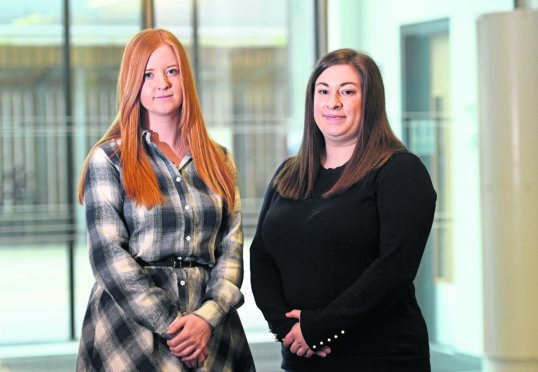Two Aberdeen women have spoken out about their experiences with a “debilitating” condition.
Endometriosis affects one in 10 women in the UK, but many women are going undiagnosed for years.
The condition causes tissue similar to the lining of the womb to grow in other places, such as the ovaries and fallopian tubes.
Affecting women of any age – endometriosis has a severe impact on sufferers’ day to day lives.
Lauren Strachan first started showing symptoms when she was 10, but 20 years on she is still waiting for an official diagnosis.
The 30-year-old has been waiting since last May to get a laparoscopy on the NHS – the only type of procedure that can determine the extent of a woman’s endometriosis.
She said: “When I was younger I would get extremely heavy periods, and would be in so much pain that I would faint, be violently sick or have to take days off school.
“It continued on through university, and in 2011 my condition flared up again, and I was adamant there was something wrong that the doctors weren’t getting.
“I knew I shouldn’t be in that much pain each day.”
It was only last April that Ms Strachan heard about endometriosis through a friend, and began to research the topic.
After heading to a GP with her newfound knowledge, she was referred to Aberdeen Royal Infirmary for an internal sonogram, and was put on the waiting list for a laparoscopy.
Nearly a year later, she is still waiting for the surgery and is stuck in “limbo” – knowing she has the condition, but unable to start treatment.
Ms Strachan also pointed out that there are few specialised doctors in the field of laparoscopy, which contributes to long waiting times.
She said: “Endometriosis is a horrible condition and the worst thing is that its invisible – so people don’t know how much pain you’re in.
“It takes a huge toll on my mental health. I’m exhausted all the time and isolate myself from social events when I’m feeling particularly awful.
“Doctors told me my pain was ‘all in my head’ and that my symptoms were “normal” side-effects of having periods.
“But it’s not natural – and people need to take endometriosis more seriously.
“More needs to be done to raise awareness, particularly in schools, so that women don’t have to wait so long to realise their condition.”
Some advice from @IamSairaKhan on endometriosis. We have helplines available here: https://t.co/o9xn6feTOw pic.twitter.com/c915kgjWli
— Loose Women (@loosewomen) March 6, 2019
Emma Cox, chief executive of Endometriosis UK, said education among healthcare practitioners, schools and public was key to driving down the “shocking” diagnosis waiting times.
She said: “The earlier the diagnosis, the sooner those with the disease can access treatment.
“In addition to physical and sometimes disabling symptoms, endometriosis can impact on all areas of a woman’s life including relationships, work and education.
“The symptoms for endometriosis – linked to periods, painful sex, bowel problems, infertility – are often considered taboo and embarrassing and the sufferer may not realise they are linked to one disease.”
Ms Strachan’s friend – Laura Fraser – also shared her story with the condition in a bid to raise awareness.
Since a young age she had the tell-tale signs of endometriosis, but was initially misdiagnosed by doctors.
She said: “My endometriosis journey began at the age very young age of nine when I started my period.
“Since then I have experienced pain, irregular periods and became a regular patient at the local doctor always looking for some more answers to the pain I had been receiving.
“I had been passed off as having IBS and bad period pains, but finally, almost 15 years later, I am one week away from my laprascopy with the hope of diagnosis and treatment.”
Ms Fraser echoed the fact that more needs to be done to help women suffereing along.
She added: “Throughout my experience it seems not many people or medical professionals know much about endometriosis and that awareness needs to be raised.
“Many women are suffering in silence due to the lack of information around this illness.”
Happy #InternationalwomensDay. Today we are celebrating our incredible volunteers who provide support to others with #endometriosis and commit their time to empowering others to do the same. pic.twitter.com/SYb5McpCCr
— Endometriosis UK (@EndometriosisUK) March 8, 2019
Endometriosis
An Aberdeen researcher also highlighted the need for further awareness of endometriosis.
Lucky Saraswat leads the Aberdeen Endometriosis Centre, which provides services and care to women living in the north and north-east of Scotland.
Her research team is currently investigating the long term health outcomes in women with endometriosis, and how the condition can affect pregnancy and the risks of further surgery or cancer.
In a bid to reduce diagnosis waiting times, they are also exploring patterns of symptoms in patients, leading a UK-wide trial into the best treatment options for patients .
Ms Saraswat explained that despite the best efforts of health care professionals, the delay for laparoscopy surgery causes “distress and anxiety” for women.
She said: “I do think education in schools, improving awareness in both public and health professionals is needed to reduce the delay in diagnosis.

“There is often a huge delay from the first symptom to the diagnosis of endometriosis which averages about eight years in the UK.
“The normalisation of pain during periods by women and health professionals and lack of awareness about endometriosis can contribute to the delay.
“Additionally, symptoms of endometriosis can overlap with other conditions such as irritable bowel syndrome or pelvic inflammatory disease, which increases the risk of misdiagnosis and contribute to further delay.
“Sadly, there is currently no cure for endometriosis.
“I am working in partnership with Endometriosis UK and in Aberdeen we are constantly seeking opinion of women and public to steer our research and answer questions most important to them.”
To find out more about the centre’s work: email lucky.saraswat@nhs.net
